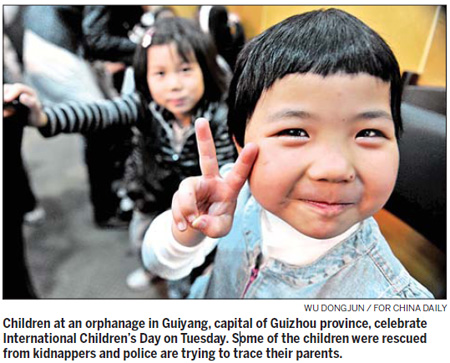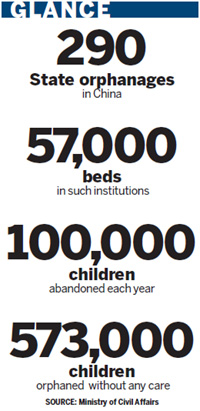Society
Orphans get lift with higher allowances
By Shan Juan (China Daily)
Updated: 2010-06-02 07:10
 |
Large Medium Small |

BEIJING - Orphaned children will from now on receive at least 600 yuan ($88) each month as living allowance till they turn 18 as the government tries to ensure that they are not left behind in the country's economic march.
The scheme will also cover children whose parents are both behind bars. Nearly 720,000 nationwide will benefit from the policy, Wang Zhenyao, director of the department of social welfare and promotion of charities affiliated to the Ministry of Civil Affairs, said Tuesday.
Currently, welfare institutions are largely funded by local governments but the allowances are meager - about 50-100 yuan per child each month - he said at the launch of the report Child Welfare in China, compiled by the ministry and the United Nations Children's Fund (UNICEF) to mark International Children's Day.

"As China edges toward becoming the second largest economy with annual per capita GDP in major cities like Shanghai exceeding $4,000, it is time to spread the wealth among children," he said.
Yin Yin Nwe, UNICEF China representative, said "we see leadership commitment here to improve child welfare" but warned the country still faces a raft of challenges.
Besides orphans, the welfare of vulnerable children living in poor rural families should also be raised as they are more susceptible to impact from incidents like fake milk powder, problematic vaccines or chemical poisoning, she said.
Of the 320 million children under 18, more than 7 million live in poverty and about 100,000 are abandoned each year, most of them girls or disabled, official figures show.
The country is also in the top five worldwide in terms of child deaths each year, according to UNICEF.
"Many are preventable, particularly in the countryside, with raised awareness and hospital childbirth," she said.
Other challenges include the widening rural-urban welfare gap, which affects up to 27 million migrant children and 55 million children left behind by their parents seeking employment in cities, she added.
"We are working closely to set up a subsidy system to help them," said Song Wenzhen, director of the children affairs department of the National Working Committee on Children and Women.